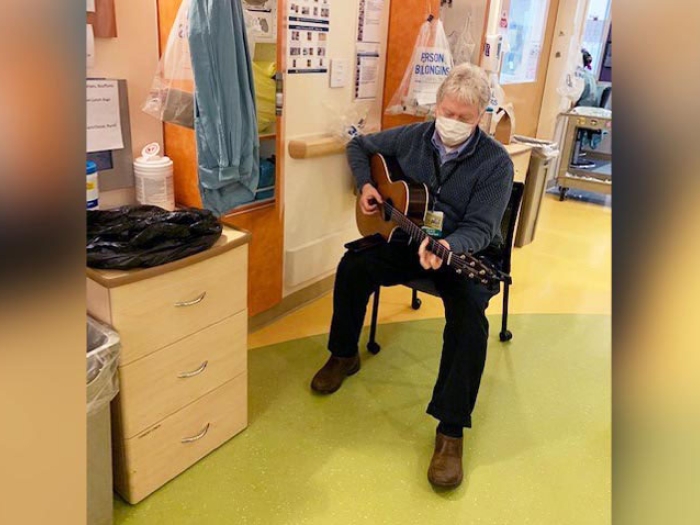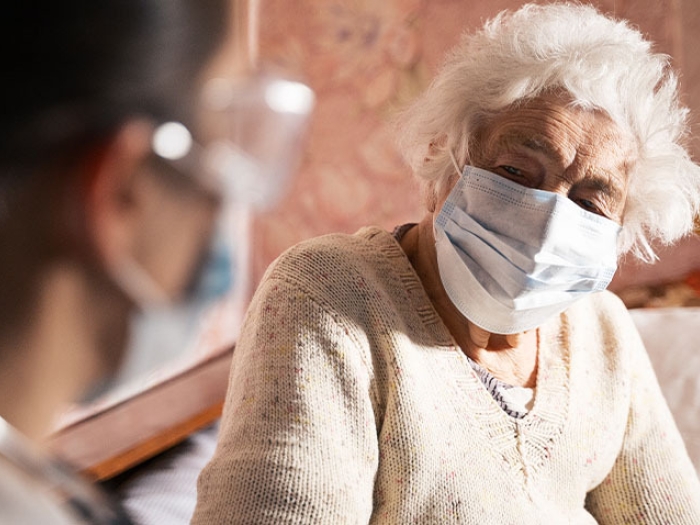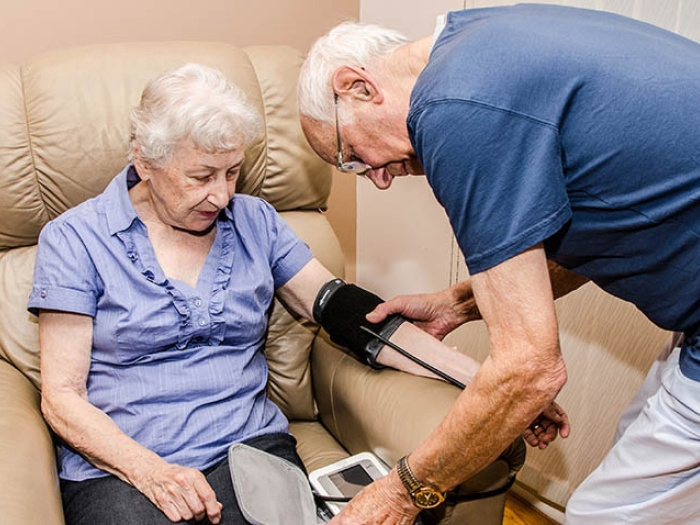From stress relief and improved mood to keeping minds sharp and connecting to others, poll finds many positives from listening to or making music
8:00 AM
Author |

Whether it’s singing in a choir, playing the living room piano, joining in hymns at church, or just whistling along with the radio, a new poll finds that nearly all older adults say music brings them far more than just entertainment.
Three-quarters of people age 50 to 80 say music helps them relieve stress or relax and 65% say it helps their mental health or mood, according to the new results from the University of Michigan National Poll on Healthy Aging. Meanwhile, 60% say they get energized or motivated by music.
Those are just a few of the health related benefits cited by older adults who answered questions about listening to and making music of all kinds.
Virtually all (98%) said they benefit in at least one health related way from engaging with music. In addition, 41% say music is very important to them, with another 48% saying it’s somewhat important.
“Music has the power to bring joy and meaning to life. It is woven into the very fabric of existence for all of humankind,” said Joel Howell, M.D., Ph.D., a professor of internal medicine at the U-M Medical School who worked with the poll team.
Music also has tangible effects on a variety of health related ailments, he adds. “We know that music is associated with positive effects on measures from blood pressure to depression.”
Listening and making music
The poll is based at the U-M Institute for Healthcare Policy and Innovation and supported by AARP and Michigan Medicine, the University of Michigan’s academic medical center. The poll team asked a national sample of adults aged 50 to 80 about their experiences with and feelings toward listening to and making music.
Many older adults reported making music with other people at least occasionally, whether by singing or playing an instrument. In all, 8% said they have sung in a choir or other organized group at least a few times in the past year. About 8% of all older adults said they play an instrument with other people at least occasionally.
In all, 46% of older adults reported singing at least a few times a week, and 17% said they play a musical instrument at least a few times a year.
Most respondents reported listening to music, with 85% saying they listen to it at least a few times a week, 80% saying they’ve watched musical performances on television or the internet at least a few times in the past year, and 41% saying they had attended live musical performances in person at least a few times in the past year. That latter percentage was higher among those with higher incomes and more education.
Music has the power to bring joy and meaning to life. It is woven into the very fabric of existence for all of humankind. "
--Joel Howell, M.D., Ph.D.
Musical habits
The poll shows other differences between groups in music listening habits and health impacts.
Those who said their physical health is fair or poor, and those who say they often feel isolated, were less likely to listen to music every day. Black older adults were more likely than others to have sung in a choir in the past year, and Black and Hispanic older adults were more likely to say that music is very important to them.
“While music doesn’t come up often in older adults’ visits with their usual care providers, perhaps it should,” said poll director Jeffrey Kullgren, M.D., M.P.H., M.S. “The power of music to connect us, improve mood and energy, or even ease pain (like 7% of respondents said it does for them), means it could be a powerful tool.”
Kullgren is a primary care physician at the VA Ann Arbor Healthcare System and associate professor of internal medicine at U-M.
Music's importance increases with age
Howell notes that music helps people keep in touch with one another throughout their lifetime. Indeed, 19% of the poll respondents said music is even more important to them now than it was in their youth, and 46% said it’s just as important to them now as then.
With the rising concern about the health effects of loneliness and social isolation among Americans in general, and especially among older adults, the power of music to connect people and support healthy aging should not be underestimated, Howell says. The NPHA has previously reported on trends in loneliness and social isolation in older adults.
“Music is a universal language that has powerful potential to improve wellbeing,” said Sarah Lenz Lock, senior vice president of Policy and Brain Health at AARP and executive director of the Global Council on Brain Health.
“AARP’s own research shows that music can play an important role in healthy aging by improving our moods, fostering social connections and, potentially, enriching our brain health.”
AARP’s website has resources, research, and information on the potential benefits of music, including its effect on the brain, memories, and overall health.
The poll report is based on findings from a nationally representative survey conducted by NORC at the University of Chicago for IHPI and administered online and via phone in July and August 2023 among 2,657 adults aged 50 to 80. The sample was subsequently weighted to reflect the U.S. population. Read past National Poll on Healthy Aging reports and about the poll methodology.
Citation: National Poll on Healthy Aging: The Sound of Music, February 2024 https://dx.doi.org/10.7302/22174
Full citation, poll questions and PDF poll report: https://deepblue.lib.umich.edu/handle/2027.42/192265

Explore a variety of health care news & stories by visiting the Health Lab home page for more articles.

Department of Communication at Michigan Medicine

Want top health & research news weekly? Sign up for Health Lab’s newsletters today!





